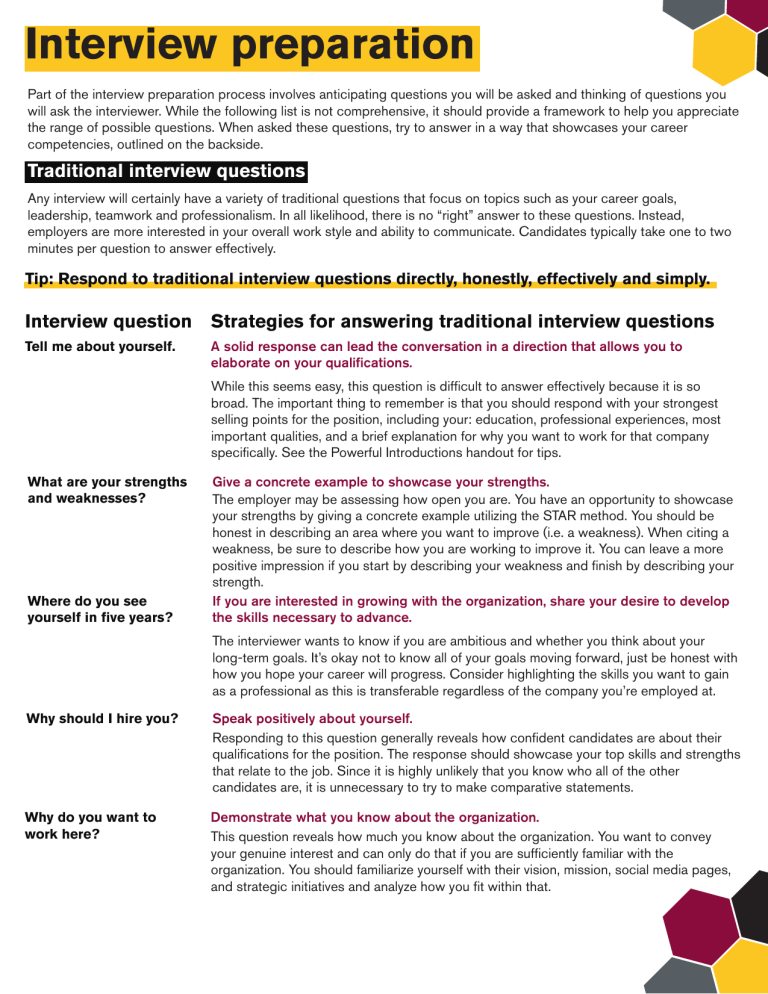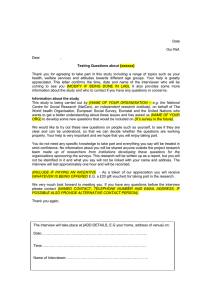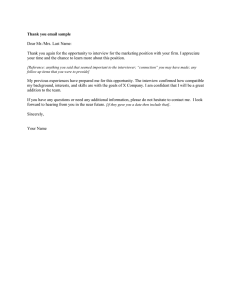
Interview preparation Part of the interview preparation process involves anticipating questions you will be asked and thinking of questions you will ask the interviewer. While the following list is not comprehensive, it should provide a framework to help you appreciate the range of possible questions. When asked these questions, try to answer in a way that showcases your career competencies, outlined on the backside. Traditional interview questions Any interview will certainly have a variety of traditional questions that focus on topics such as your career goals, leadership, teamwork and professionalism. In all likelihood, there is no “right” answer to these questions. Instead, employers are more interested in your overall work style and ability to communicate. Candidates typically take one to two minutes per question to answer effectively. Tip: Respond to traditional interview questions directly, honestly, effectively and simply. Interview question Strategies for answering traditional interview questions Tell me about yourself. A solid response can lead the conversation in a direction that allows you to elaborate on your qualifications. While this seems easy, this question is difficult to answer effectively because it is so broad. The important thing to remember is that you should respond with your strongest selling points for the position, including your: education, professional experiences, most important qualities, and a brief explanation for why you want to work for that company specifically. See the Powerful Introductions handout for tips. What are your strengths and weaknesses? Where do you see yourself in five years? Give a concrete example to showcase your strengths. The employer may be assessing how open you are. You have an opportunity to showcase your strengths by giving a concrete example utilizing the STAR method. You should be honest in describing an area where you want to improve (i.e. a weakness). When citing a weakness, be sure to describe how you are working to improve it. You can leave a more positive impression if you start by describing your weakness and finish by describing your strength. If you are interested in growing with the organization, share your desire to develop the skills necessary to advance. The interviewer wants to know if you are ambitious and whether you think about your long-term goals. It’s okay not to know all of your goals moving forward, just be honest with how you hope your career will progress. Consider highlighting the skills you want to gain as a professional as this is transferable regardless of the company you’re employed at. Why should I hire you? Speak positively about yourself. Responding to this question generally reveals how confident candidates are about their qualifications for the position. The response should showcase your top skills and strengths that relate to the job. Since it is highly unlikely that you know who all of the other candidates are, it is unnecessary to try to make comparative statements. Why do you want to work here? Demonstrate what you know about the organization. This question reveals how much you know about the organization. You want to convey your genuine interest and can only do that if you are sufficiently familiar with the organization. You should familiarize yourself with their vision, mission, social media pages, and strategic initiatives and analyze how you fit within that. Why did you leave your last job? Always bring up the positive attributes of your previous employment even if it was not always a positive experience. It’s normal for people to move on to new positions and organizations throughout their career. In your response to this question, consider how moving from one position to another helped your professional growth sounds better to me than hepled in your professional growth. What accomplishments are you most proud of? Choose a relevant accomplishment. What are your salary expectations? Steer clear of discussing salary specifics before receiving a job offer. As with most interview responses, be specific and select an accomplishment that relates to the position. If your greatest accomplishment seems unrelated to the position, try using the NACE Career Competencies on the next page to help connect your accomplishment with the position. This is one of the hardest questions, particularly for those with limited experience. Before the interview, research the salary range in your field. Let the interviewer know you will be open to discussing fair compensation when the time comes. If pressed for a more specific answer, always give a range rather than a specific number. Refer to our Negotiating a Salary handout for more strategies on how to effectively negotiate. Behavior-based questions Behavioral based questions are designed to determine your likely future behavior given specific experiences from your past. It’s important to answer these questions using the STAR response method. Refer to our handout on Crafting your Career Story for practice questions and information on STAR Responses. Interview question Strategies for answering behavior-based questions Tell me about a difficult decision you made. The interviewer’s goal is to understand your thought and decision-making process. Describe a situation in which you went above and beyond expectations. The interviewer is trying to measure your initiative and your energy. What did you do in a project that contributed to the team environment? Your answer reveals how successfully you interact with others. What strategies did you use in your last job to organize and prioritize tasks? Responding to this question provides evidence about how you organize, plan and prioritize. Which factors did you consider in your actions? How thorough were your ideas and their execution? How do you measure your own effectiveness? Tell me about a time when you had to bend the rules. This demonstrates your flexibility and your commitment to continuous improvement. Did you use good judgment when determining whether to bend this particular rule? What rules do you consider bendable? Do you know the difference between bending and breaking a rule? Tell me about a time you encountered a difficult customer or co-worker. Your answer should leave emotions out. Focus on the resolution and your role in effectively managing the situation. Make sure to focus on the positive resolution of this difficult situation or experience. What factors did you consider when making the decision? What alternatives did you consider? Did you think about additional timelines, deadlines, quality, budget, monetary issues, etc.? What were the expectations that were given? What actions did you take to exceed those expectations? What were the results of you going above the expectations? How did you make a difference to the project? What was your leadership style? What were your main contributions to the project and to the team? Technical interview questions Depending on the job, employers will want to know if you have the specific skills that are required to complete certain job tasks. In these situations, you may be asked some technical questions. These questions are usually not designed to be easy and getting the “right” response, while preferable, may not be crucial. When responding to a technical question, employers are evaluating your logic in solving a problem. Walk the interviewer through your thought process and demonstrate how you arrive at your answer. Examples of technical questions: • What is your experience in operating tools to assess the security of IT networks? • What is the capacity of human brain memory? Questions to ask your interviewer It is important to have at least a couple of questions that you will ask the interviewer(s) at the conclusion of your conversation. Candidates have a good deal of flexibility in the questions they ask. Now is the time to ask questions ranging from small details about the job to big picture analytic questions. This is your chance to ask questions that can’t be answered through the job description or by searching the organization’s website. Try to avoid questions that are based on the presumption of being offered the position (i.e. what is the salary range for this position?”) too early on in the interviewing process. Questions of this nature can be raised after the preliminary interviews if they haven’t been addressed by the employer already. • What brought you to this organization? Can you tell me about your own experiences, so far? • What have been some major contributions made by individuals who have held this job previously? • What are some examples of problems I would be expected to address? • Based on your experience with the company, what have you seen in terms of opportunities for advancement in this functional area? • Could you tell me about the people with whom I would be working? What types of positions do they hold? • How would you characterize the culture of this organization? NACE career competencies icons These icons represent the eight career competencies that students should have experience with in order to be career ready at graduation. Look for these symbols next to the interview questions on this handout that highlight these career competencies. Career & self-development Leadership Equity & inclusion Critical thinking Professionalism Teamwork Technology


